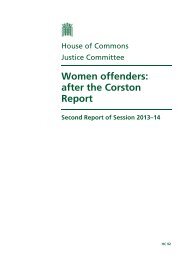Listen Up - Social Welfare Portal
Listen Up - Social Welfare Portal
Listen Up - Social Welfare Portal
You also want an ePaper? Increase the reach of your titles
YUMPU automatically turns print PDFs into web optimized ePapers that Google loves.
listenup!66 | Chapter 8psychiatrists, community psychiatric nurses, GPs,social workers, police officers, and A&E workerswould provide more sensitive services if theyreceived such training, and heard from young peopleabout their experiences of mental health issues.“Sharing their personal experience of mental healthproblems is a powerful tool in de-stigmatising anddispelling myths.”Project worker, Experience in Mind,Mind in Brighton and Hove, and Hove YMCAExperience in Mind, a partnership between Mindin Brighton and Hove, and Hove YMCA, was verydifferent from the seven other organisations asit did not offer mental health services for youngpeople, but asked young people with experience ofmental health problems to train staff from outsideagencies. The training package, developed anddelivered by young people, covered four main areas:communication; self-harm; depression; and stress.The training was ‘experiential’: based on youngpeople’s actual experience as opposed to theory.“We want to reduce the stigma… and not be seenjust as people with mental health difficulties, but aspeople like everyone else.”Young personYoung people who wanted to deliver the traininghad the opportunity to take a Level 2 OCN (OpenCollege Network) accredited course, ‘Trainingthrough Experience’, to learn the necessary trainingskills, such as presentation and group work skills.The training used a variety of techniques, includingshowing films and making presentations as wellas role play, discussion and quizzes. Each trainingsession was tailor-made to its audience, based ontheir needs and their mental health awareness,and could last from one hour to a whole day, withthe usual length being three hours. The youngpeople were paid for the training they delivered inrecognition of the experience and skills they brought.In March 2007, the training was piloted with Mindand YMCA professionals, and at the time of going topress, training sessions were being booked by otheragencies. A number of colleges, youth groups andorganisations in the local housing sector had alsoexpressed an interest in taking the training, as well associal workers and A&E staff.Young people were involved in all areas of theproject, from designing the training through to itsmarketing; this meant they felt they had ‘ownership’of the project. As a result of this high level ofinvolvement, the young people were able to developa wide range of skills, alongside training skills, whichwere important not just for their self confidenceand relationships, but for future employmentopportunities as well:• respect – learning how to work effectively in a group;• appreciation of others – understanding diversity;• tact – the ability to express opinions whilstrespecting other points of view;• trust – confidentiality; keeping informationdisclosed within group work confidential;• courage – the ability to express traumatic eventsobjectively and publicly;• understanding of different learning styles;• time keeping;• target setting – planning for the future;• working as a reference group, helping to makestrategic decisions;• increased self confidence;• raised self awareness;• optimism – accepting past and present difficultiesas tools of learning;• tolerance;• taking responsibility for themselves.
















